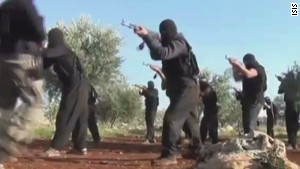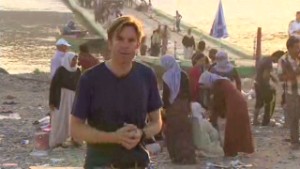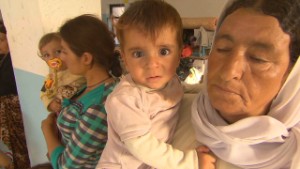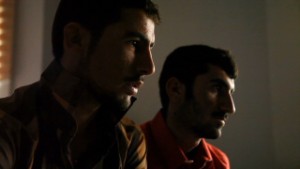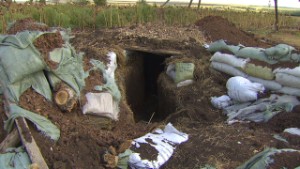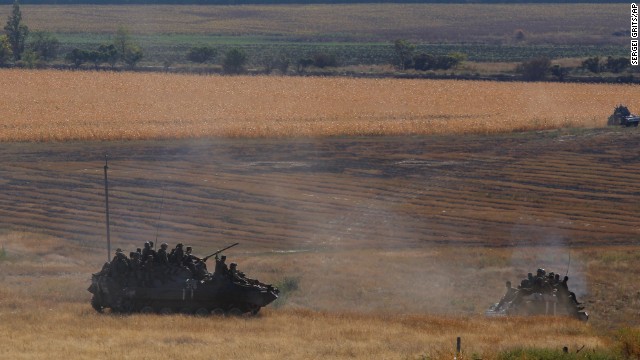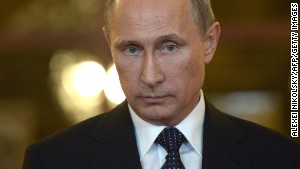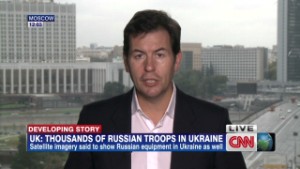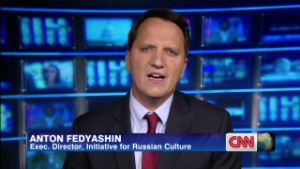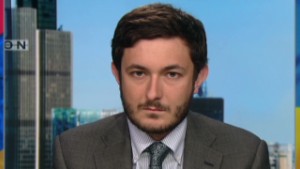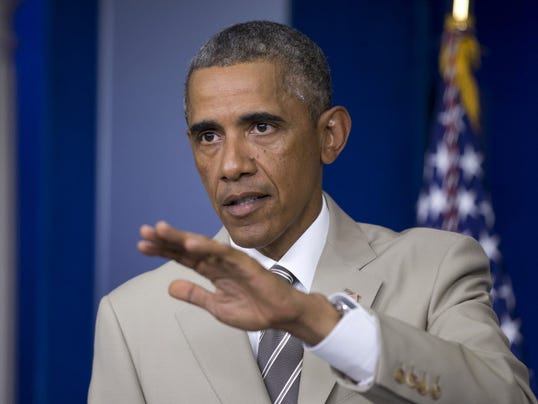1 September 2014 Last updated at 01:31 ET
Some people in Mariupol are already leaving because they fear an attack by pro-Russian separatists, as Richard Galpin reports from the city
Leading American senators have called for the US to send weapons to help Ukraine fight what they say is "a Russian invasion".
The head of the Senate Foreign Relations Committee said Russia must face a cost for its "aggression".
Earlier, Russian leader Vladimir Putin called for talks to discuss the issue of "statehood" for eastern Ukraine.
Some 2,600 people have died since fighting erupted between pro-Russian rebels and Ukrainian troops in April.
The conflict broke out after Russia's annexation of Ukraine's southern Crimea peninsula in March.
The separatists have been gaining ground on Ukrainian forces in recent days, in both the Luhansk and Donetsk regions, and further south around the port of Mariupol.
Last week's first direct talks between Mr Putin and Ukrainian President Petro Poroshenko in Minsk did not lead to any major breakthrough.
A meeting of the so-called Contact Group on Ukraine is expected to start later on Monday in Minsk, Belarus.
Representatives of Ukraine, Russia and the Organization for Security and Co-operation in Europe will attend the talks. The participation of pro-Russian rebels from eastern Ukraine remains unclear.
'On the table'
Robert Mendez, a Democrat who runs the Senate Foreign Relations Committee told CNN: "We should provide the Ukrainians with the type of defensive weapons that will impose a cost upon Putin for further aggression.
 Pro-Russian rebels have been gaining ground in recent days
Pro-Russian rebels have been gaining ground in recent days Residents of Mariupol form a human chain in protest against Russia's actions
Residents of Mariupol form a human chain in protest against Russia's actions John McCain called for "strong sanctions" on Russia
John McCain called for "strong sanctions" on Russia
"This is no longer the question of some rebel separatists, this is a direct invasion by Russia. We must recognise it as that."
He said the issue "may very well be on the table right now" for President Barack Obama.
Senator John McCain told CBS's Face the Nation that Mr Putin was "an old KGB colonel that wants to restore the Russian empire".
Mr McCain called for "strong sanctions", before adding that Ukraine must be supplied with weapons: "Give them the weapons they need. Give them the wherewithal they need. Give them the ability to fight."
Representative Mike Rogers, chairman of the House Intelligence Committee, told Fox News: "If we don't provide 'small and effective' now, you're going to get very big and very ugly later."
 Vladimir Putin visits Siberia. He called for discussions on east Ukrainian "statehood"
Vladimir Putin visits Siberia. He called for discussions on east Ukrainian "statehood"
In Ukraine, there were reports of a first naval encounter in the conflict.
As we drove south from Dnipropetrovsk to the strategic port city of Mariupol, we soon saw how the Ukrainian army is now building up its forces to protect the south-eastern city from the assault threatened by pro-Russian rebels.
A train carrying about 20 Grad multiple rocket-launchers as well as armoured vehicles, ammunition and troops, was heading in the same direction as us.
Further down the road we came across smaller groups of armoured vehicles with heavily-armed troops sitting on top. Like those on board the train, they were reluctant to talk about their mission.
But Mariupol is preparing for the worst with soldiers digging trenches and using huge concrete tank-traps to block roads.
It's not clear if or when the separatist rebels - and quite possibly Russian troops - will launch an attack on this port city of almost half-a-million people which lies on the coast of the Azov Sea.
But already the authorities in Mariupol say two coastguard ships came under attack on Sunday leaving six sailors injured.
Pro-Russian separatists fired artillery shells at a Ukrainian patrol vessel in the Azov Sea, with the Ukrainian military saying a rescue operation was under way.
The rebels have gained ground in the far south-east, pushing towards Mariupol, where Ukrainian troops and local residents are strengthening defences.
But many have fled the city of 500,000 people.
Ukraine and the West blame Russian military support for the recent rebel gains, saying armoured columns have crossed the border. Russia denies military involvement.
Earlier, Mr Putin said the issue of "statehood" for eastern Ukraine needed to be discussed to ensure the interests of local people were "definitely upheld".
"Russia cannot stand aside when people are being shot at almost at point blank," he said, describing the rebels' actions as "the natural reaction of people who are defending their rights".
The West, Mr Putin said, should have foreseen Russia's reaction to the situation, adding it was impossible to predict how the crisis would end.
- At least 2,593 people killed since mid-April (not including 298 passengers and crew of Malaysian Airlines MH17, shot down in the area) - UN report on 29 August
- 951 civilians killed in Donetsk region alone, official regional authorities said - 20 August
- In some particularly dangerous places, such as Luhansk region, victims are said to have been buried informally, making accurate counts difficult
- Rebels (and some military sources) accuse the government of concealing true numbers
- 155,800 people have fled elsewhere in Ukraine while at least 188,000 have gone to Russia
Mr Putin's spokesman, Dmitry Peskov, later said the president's remarks on "statehood" should not be taken to mean an actual separate entity, and that the Ukrainian crisis was a "domestic" one.
Mr Putin's comments came after the EU gave Russia a one-week ultimatum to reverse course in Ukraine or face more sanctions.
Mr Putin dismissed the EU threat, accusing it of "backing a coup d'etat" in Ukraine.
The EU and US have already imposed asset freezes and travel bans on many senior Russian officials and separatist leaders in eastern Ukraine.
On Saturday, Ukrainian President Petro Poroshenko said: "I think that we are very close to the point of no return. Point of no return is full-scale war."

